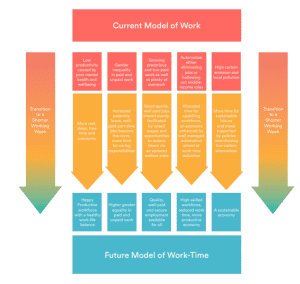4 day working weeks – Are they as effective as people say
In recent times, there have been many factors contributing to the conversation of the 4-day working week coming to the UK. There is becoming a wider acceptance that frequent, long hour days doesn’t necessarily equal high productivity amongst workers, and that mental health, physical health and general wellbeing can be hugely impacted by this relentless approach to work. Not to mention worker fatigue, and the safety and environmental impacts. There are also questions around how certain expectations affect the ability to have a genuinely equal workplace, and how ever-changing technological advances aid automation.
International comparisons show that the number of hours worked in a particular country has no direct causation to the strength of its economy. In fact, countries working less hours are often showing higher levels of GDP per person. Other benefits include better-rested employees, less workplace stress, increased motivation, increased talent retention, reduction in carbon footprint and promoting an equal workplace.
In January 2019, Autonomy, a UK based Think Tank, published a proposal for the 4-day working week. The image below was included within the report and shows what the transition could look like.
 It highlights some key challenges arising from the UK’s current model of work – including factors relating to health, equality, pay, skills and environment. These are all useful considerations for employers to make when thinking about the concept of a shorter working week.
It highlights some key challenges arising from the UK’s current model of work – including factors relating to health, equality, pay, skills and environment. These are all useful considerations for employers to make when thinking about the concept of a shorter working week.
Other considerations could include the following:
- The impact a reduced working week could have on customers, clients and services
- How any gaps could be addressed, through scheduling or automation of processes, for example
- Any technological advances that could be implemented
- What your current workplace culture looks like
- Costs associated with a reduced working week
- Whether or not a trial would be best, initially
It is suggested that in order to achieve the potential benefits of a reduced working week that it must be a true reduction on the same pay, rather than compressed hours. The Autonomy proposal suggests that in the absence of a drop in productivity, there is no automatic justification for a reduction in wages – another useful consideration to make.
To further evidence the benefits that a reduced working week could have, a number of studies have been conducted. As reported by the BBC in July 2021, National Government & Reykjavik City Council conducted a study across 4 years from 2015-2019, where 2,500 workers reduced their working week by 4 or 5 hours. The majority of employers found that productivity either increased or remained the same, during the trial. As a result, and following some negotiations by unions, 86% of Icelandic workers now work a shorter week or will gain the right to. There have also been studies into the cost of poor mental health on the UK economy (£33-42 billion), improvements on general household well-being where one member is at home with the family whilst another are in employment, how errors and misdiagnosis are made and, in Finland, how those with little or no control over their working hours are more likely to experience workplace stress and higher sickness absence.
For further reading, and details of these studies conducted into the concept of the 4-day working week please click the link below to the Autonomy Proposal:
http://autonomy.work/wp-content/uploads/2019/02/Shorter-working-week-docV5.pdf
It has also been reported by Fast Company that following a study conducted by the Perpetual Guardian in New Zealand, 24% of employees felt they could achieve a better work/life balance, stress decreased by 7% overall, overall work satisfaction increased by 5% and productivity remained the same. This study was only conducted over a period of 2 months, but gives a positive indication as to how a shorter working week could benefit the wellbeing of employees.
However, Fast companies also point out some drawbacks to the concept:
- The risk is expensive if workers fail to meet requirements
- There may be some industries where scheduling will make a shorter working week impractical
- Some people may want to work a long week and aren’t able to
- People may work the same hours anyway, potentially causing some costly over-time payments
When considering the environmental impact that a shorter working week could bring – Stop the Clock is a useful campaign that illustrates both the benefits and risks. Reported in May 2021, the campaign highlighted the following:
Environmental benefits
- Reduced electricity usage
- Carbon emissions reduced by less commuting
- Household energy-intensive behaviours reduced
- An increase in low carbon activities
- General health improvements
Environmental risks
- An increase in people taking flights for short breaks
- Driving further for activities such as shopping
- Staying at home more often leads to an increase in TV watching and heating use
- Employers may use more automated machinery to complete work on time, therefore using more energy
In conclusion, we still may be a while off the shorter working week being applied across the UK, but the evidence so far suggests that whilst there are some risks and it may not work for everyone, in the main, the benefits can be extremely positive.
For more information on employee engagement and well-being call Clover HR on 0330 175 6601 (or email us at info@cloverhr.co.uk)


